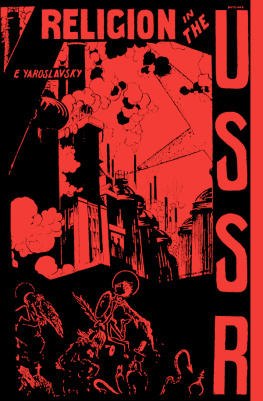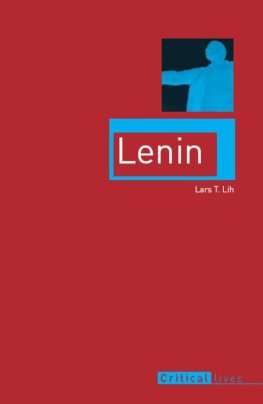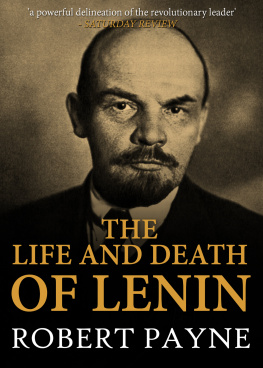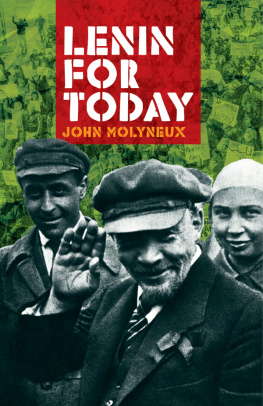Yemelyan Yaroslavsky - Lenin: His Life and Work
Here you can read online Yemelyan Yaroslavsky - Lenin: His Life and Work full text of the book (entire story) in english for free. Download pdf and epub, get meaning, cover and reviews about this ebook. City: Chicago, year: 1946, publisher: Daily Worker, genre: History. Description of the work, (preface) as well as reviews are available. Best literature library LitArk.com created for fans of good reading and offers a wide selection of genres:
Romance novel
Science fiction
Adventure
Detective
Science
History
Home and family
Prose
Art
Politics
Computer
Non-fiction
Religion
Business
Children
Humor
Choose a favorite category and find really read worthwhile books. Enjoy immersion in the world of imagination, feel the emotions of the characters or learn something new for yourself, make an fascinating discovery.
- Book:Lenin: His Life and Work
- Author:
- Publisher:Daily Worker
- Genre:
- Year:1946
- City:Chicago
- Rating:4 / 5
- Favourites:Add to favourites
- Your mark:
- 80
- 1
- 2
- 3
- 4
- 5
Lenin: His Life and Work: summary, description and annotation
We offer to read an annotation, description, summary or preface (depends on what the author of the book "Lenin: His Life and Work" wrote himself). If you haven't found the necessary information about the book — write in the comments, we will try to find it.
Lenin: His Life and Work — read online for free the complete book (whole text) full work
Below is the text of the book, divided by pages. System saving the place of the last page read, allows you to conveniently read the book "Lenin: His Life and Work" online for free, without having to search again every time where you left off. Put a bookmark, and you can go to the page where you finished reading at any time.
Font size:
Interval:
Bookmark:
His Life and Work
By
Price 25 Cents
Published by
TheDAILY WORKER PUBLISHING COMPANY 1113 W. WASHINGTON BOULEVARD CHICAGO ILL.
ALLIED PRINTING (UNION LABOR) TRADE COUNCIL, CHICAGO

Vladimir Ilyitch Ulianov-Lenin was born on April 23, 1870, in the town of Simbirsk. His ancestors were peasants. His grandfather was registered as a citizen1 of the town of Astrakhan.
1 He was registered as a "meschanin," which is synonymous with the word "burgher." In Russia until the revolution the people were divided into various "orders" of which "meschanin" was one.
The father of Lenin, Ilya Nikolaievitch Ulianov, was a director of elementary schools. He was a just man, very clever, respected by all who came in contact with him, particularly by the teachers in the urban and rural schools. He opened more than 400 such schools with 20,000 pupils. He never owned land or property.
Comrade Elizarova, Comrade Lenin's eldest sister, relates: "He was rather a plain man. In Samara in 1878, he bought a log house which, on moving to Kazan in 1887, mother sold."
Comrade Lenin had two brothers, Alexander and Dmitri. Alexander was executed by Czar Alexander III. Dmitri is still alive. Two sisters of Lenin are also still living, Anna Ilinichna Elizarova and Maria Ilinichna Ulianova. One sister, Olga, died when Lenin was still quite young. Lenin's mother, Maria Alexandrovna, died before the revolution, in 1913. Lenin was very fond of his mother and even when he lived in exile abroad he cared for her a great deal and sometimes he tore himself away from the most pressing work in order to serve her in some way. Lenin's family was a very happy one, always living modestly on the proceeds of its own labor.
A story is related which illustrates the character of Lenin's mother. In 1899, when Lenin was in exile in Siberia, Lenin's mother went to Petrograd in order to appeal to the Director of the Department of Police to allow her son to go abroad, or at least to transfer him to Pskov. When the director came out of his room and saw Lenin's mother, he said to her sneeringly with all the arrogance and cynicism of a Czarist official:
"You ought to be proud of your children: one of them has been hanged and the other has the noose round his neck."
And Lenin's mother replied with extreme dignity:
"Yes, I am proud of my children."
Even when he was quite young Comrade Lenin attracted attention by his abilities. In school he kept rather to himself, read a great deal, studied hard at foreign languages which he came to know very well.
The news of the arrest of his elder brother, Alexander, came when Lenin was still at college. At that time the fight against the Czarist government was being conducted by the revolutionary party known as the "Narodnaya Volya." On March 1, 1881, the Narodnaya Volya Party assassinated Czar Alexander II because of the cruelties he perpetrated on the peasantry, because of the support which he gave to the landed nobility in their oppression of the peasantry, and because of the freedom he granted the capitalists to exploit the workers. The members of this party were brave men and women who entered into this unequal single combat with the Czarist autocracy. One of these heroic individuals was Alexander UlianovLenin's elder brother. About that time the Executive Committee of the Narodnaya Volya was disbanded and its members executed by the Czarist government, and Alexander, with several of his comradesOssipanov, Shevirev, Amdreushkin, Generalov and othersresolved to continue this unequal fight.
Czar Alexander III was still more autocratic and feudalistic than his father. He was terrified by his father's death and launched a reign of terror throughout the country. On March 13, 1887, Alexander Ulianov, who was preparing Alexander II's fate for Alexander III, was arrested. The news reached Simbirsk, where Lenin, then 17 years of age, was at college. The members of the family hesitated to break the news to their mother. Comrade Lenin, however, undertook to do so and did it with great firmness. Already at that time he revealed great self-command in moments of difficulty.
The impression upon Comrade Lenin of the arrest and execution of his brother is related by his sister, Maria. When the news came, in the spring of 1887, Comrade Lenin said, "No, we will not go that way; that way is no use." And from that moment he began to train himself to take the path which he regarded as the only correct one towards the emancipation of Russia from Czardom and capitalism.
From his sister also we learn with what zeal and energy Comrade Lenin worked in order to acquire the knowledge that ultimately enabled him to become the leader of the revolutionary movement in Russia. Lenin spent whole days over his books, tearing himself away only to take some exercise or to take part in the discussions with the small group of comrades who, like himself, were training themselves for revolutionary work. He retained this capacity for work all his life.
Even in his youth Comrade Lenin commanded the respect of those around him and his friends flocked to him for information and advice. A schoolmate of his relates how even at the time of which we are writing, his comrades used to take every possible opportunity during rambles in the country, in the public parks, or during winter games, to gather round in a close circle and put questions to Lenin about democracy, about the rights of the peasantry, the hard lot of the working class, all of which were very earnestly discussed.
There is not the slightest doubt that already, in those early years, even while at school, Lenin became imbued with hatred for the landed nobility, for the capitalists and the autocratic government. His thoughts were with his brother, incarcerated in the Schlsselburg Fortress, waiting to be hanged. The trial was short and ruthless. On May 19 of that year, two months after the arrest, Alexander Ulianov and his comrades were hanged in the Schlsselburg Fortress. And from that moment young Vladimir Ulianov never ceased in his efforts to discover the means of destroying that cursed autocratic system.
![]()
Comrade Lenin graduated from Simbirsk college in 1887, receiving the highest ratings in all subjects. He was to have received a gold medal. However, he was not permitted to enter the university in Petersburg because it was feared that he would follow in his brother's foot-steps and would try to take revenge for his death as well as for the sufferings of the people. He entered Kazan University in the autumn of 1887, but already on December 5 of that year, he was expelled for participation in student movements and deported to the village of Kokushkino in the Government of Kazan.
In 1888, he applied for readmittance to the university but the application was turned down, so that he was neither admitted to the university in the capital nor in the provinces. Comrade Lenin then applied to be allowed to continue his education abroad but the government realized that he was to be a dangerous enemy in the future, and refused to allow him to go abroad.
In the autumn of 1888, permission was given to Comrade Lenin to live at his mother's house in Kazan, where she had settled with her family. Here it was that Lenin began to study Marx's "Capital," and became greatly absorbed in it.
In the summer of 1889, Comrade Lenin moved to Samara where he was able to become more closely acquainted with the revolutionary Communist doctrines of Karl Marx. Of Marx's works only a few were known in Russia at that time and to study them was very difficult. The police were vigilant and took note of every one who read such literature. Lenin was already noted in the "bad books" of the gendarmerie and police. He could not come to any arrangement with the university. He applied for permission to take his examinations but this was refused. Only in 1891 was permission given him to go to Petersburg to take his examinations. Finally, in 1891, he passed his examinations in the Law Faculty and obtained the degree of Assistant Barrister. By that time Lenin had become thoroughly acquainted with the doctrines of Marx and became his loyal and worthy pupil.
Font size:
Interval:
Bookmark:
Similar books «Lenin: His Life and Work»
Look at similar books to Lenin: His Life and Work. We have selected literature similar in name and meaning in the hope of providing readers with more options to find new, interesting, not yet read works.
Discussion, reviews of the book Lenin: His Life and Work and just readers' own opinions. Leave your comments, write what you think about the work, its meaning or the main characters. Specify what exactly you liked and what you didn't like, and why you think so.










